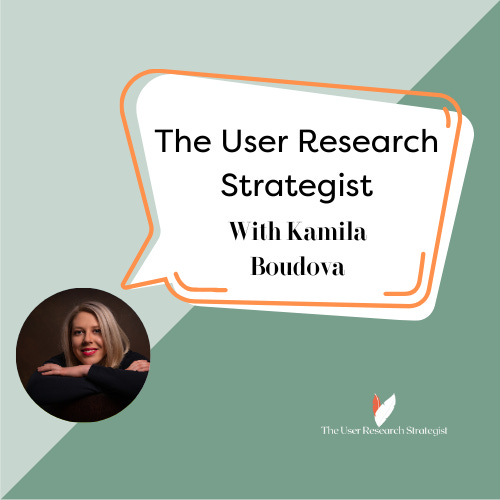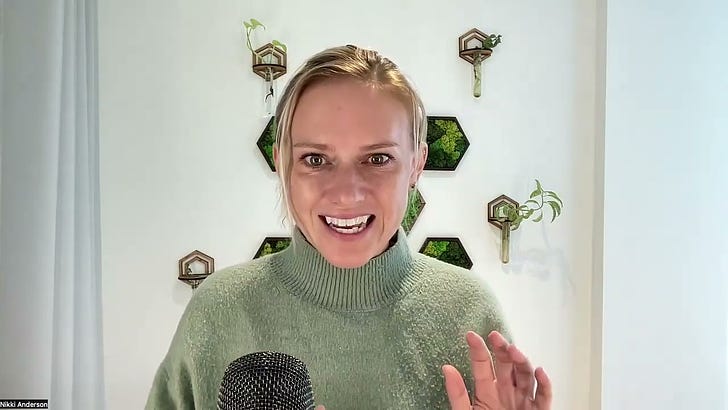Listen now on Apple, Spotify, and YouTube.
—
Kamila has a background in Anthropology and Human Ethology, which has always fueled her curiosity about people and their behaviors. However, she started my career in management consulting at KPMG but quickly realized how much she missed research. That’s when she discovered user research and knew it was the perfect fit for her. She joined a software company, Avast, where she worked her way up, learning the ins and outs of the field. After the tech industry faced a wave of layoffs, she took the leap into freelancing. Since then, she has worked with both small teams and large corporations, building a network of clients that keeps me inspired and engaged.
Research isn't just work for her—it's what keeps her curious and motivated every day. And when she isn’t researching or chatting about it, you probably (won’t) find her getting lost in the mountains or exploring remote landscapes.
In our conversation, we discuss:
How Kamila moved from an in-house user research role to freelancing and the key factors in making that decision.
Why freelancing is more than just research—covering project management, finances, marketing, and self-discipline.
How to frame your experience in a way that resonates with business-minded clients and attracts the right opportunities.
Understanding pricing models (hourly, project-based, day rate) and how to ensure your work is financially sustainable.
The importance of networking, proactive outreach, and leveraging word-of-mouth to build a steady pipeline of work.
Some takeaways:
Freelancing is not just about research; it’s a business. Becoming a freelance user researcher means wearing multiple hats—project manager, salesperson, accountant, and marketer. Success depends on mastering these additional skills, not just research expertise, and embracing the unpredictability that comes with being your own boss. Structuring your time and processes efficiently is just as crucial as delivering high-quality research work.
Confidence and stakeholder management are essential skills. One of the biggest differences between in-house and freelance work is the ability to push back on requests, frame research in business terms, and advocate for the right methods. New freelancers should be prepared to confidently lead discussions with clients, translating research findings into language that executives and product teams understand. Without strong stakeholder management, freelance researchers risk being seen as order-takers rather than strategic partners.
Your portfolio should highlight business impact, not just research methods. Potential clients care less about research techniques and more about measurable outcomes. A strong portfolio should emphasize how research influenced revenue, engagement, or decision-making rather than detailing methodologies. Tailoring case studies to align with each potential client’s industry and specific challenges will significantly increase the chances of securing work.
Pricing correctly prevents burnout. When setting freelance rates, account for more than just living expenses—consider taxes, health insurance, vacation time, and unpaid work (such as admin and sales). Many new freelancers undercharge and struggle financially as a result, leading to overwork and stress. Planning for financial sustainability early on ensures long-term success and allows for flexibility when taking on projects.
Finding work requires proactive outreach. Clients don’t magically appear, and waiting for inbound inquiries is rarely a reliable strategy, especially at the beginning. Successful freelancers attend networking events, directly reach out to potential clients, and sometimes offer small audits or heuristic evaluations to showcase value. A consistent effort in building relationships and demonstrating expertise often leads to referrals, which can become the most stable source of income over time.
Where to find Kamila:
ADP List: https://adplist.org/mentors/kamila-boudova
The Impact Membership : A space for user researchers who think bigger
You know your craft. You’ve run the studies, delivered the insights, and seen what happens when research is ignored. You’re ready to go beyond execution and start making real strategic impact but, let’s be honest, that’s not always easy.
That’s where the Impact Membership comes in.
This is not another free Slack group or a place to swap survey templates. It’s a curated community for mid-to-senior user researchers who want to:
Turn research into influence – Get insights to stick, shape product and business strategy, and gain real buy-in.
Break out of the research silo – Learn from peers facing the same challenges and work through them together.
Stay sharp and ahead of the curve – Dive deep into advanced research strategy, stakeholder management, and leadership.
Why join now?
You don’t have to figure this out alone – Every member is carefully selected, so you’re learning alongside people who truly get it.
Get real value, fast – No fluff, no generic advice—just focused conversations, expert-led sessions, and practical guidance you can use right away.
Make it work for you – Whether you want to participate actively or learn at your own pace, there’s no pressure—just a space designed for impact without overwhelm.
Membership fee: £627/year or £171/quarter
This isn’t just about keeping the lights on. Your membership funds exclusive research initiatives, high-caliber events, guest speakers, and a space that actually pushes the field forward.
Spots are limited because we keep this community tight-knit and high-value. If you’re ready to step up and drive meaningful change through research, we’d love to have you.
Interested in sponsoring the podcast?
Interested in sponsoring or advertising on this podcast? I’m always looking to partner with brands and businesses that align with my audience. Reach out to me at nikki@userresearchacademy.com to learn more about sponsorship opportunities!
The views and opinions expressed by the guests on this podcast are their own and do not necessarily reflect the views, positions, or policies of the host, the podcast, or any affiliated organizations or sponsors.













Share this post